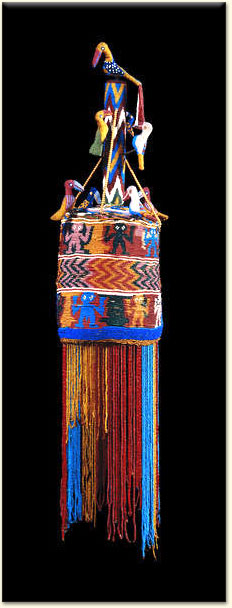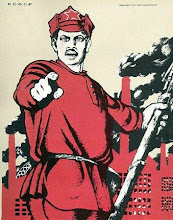Some think that Heisenberg was committed to making a real effort to secure an atomic weapon for the Third Reich, and some say he knowingly stayed behind to hinder the efforts.
Read the following and see what you think.
Thomas Powers, 1993: Heisenberg's War, p. 41 (the references to notes at the end of the book have been omitted.) Little, Brown and Co., 609 pp.
...In this struggle Heisenberg was exposed to the full force of irrational Nazi passions; his enemies had little understanding of his real work, but focused on him the accumulated anger of decades. A leader of the attack was Johannes Stark, who bitterly resented the mathematical theorists who patronized his work. Sommerfeld had even mocked his name -in German stark means "strong"- by calling him "Giovanni Fortissimo." In December 1935, in a speech at a ceremony renaming the physics institute in Heidelberg for Philipp Renard, Stark singled out Heisenberg as "the spirit of Einstein's spirit." Heisenberg responded with an even-tempered defense of theoretical physics, including relativity, in the Nazi party newspaper Völkischer Beobachter in February 1936, but the editors appended a Stark counterattack which dismissed Heisenberg's work as "an aberration of the Jewish mind."
Back and forth the paper salvos went over the next year, until Stark in July 1937 backed Heisenberg into a corner with an unrestrained assault in Das Schwarze Korps, the newspaper of the Schutzstaffeln or SS, calling him a "white Jew." By this time all traditional standards of scientific discourse had gone by the way; Stark's attack was relentlessly personal, charging that Heisenberg's career was based on Jewish friends and influence. Heisenberg's friend in Leipzig Baertel van der Waerden told him that being called a "white Jew" was something he could be proud of. But the honor came dear. The University of Munich promptly dropped its efforts to name Heisenberg to Sommerfeld's post, and Stark's vendetta threatened still worse: in an anonymous note the editors of Das Schwarze Korps recommended that "white Jews" like Heisenberg should be caused to "disappear". Since the SS was the private army and police of the Nazi party, and since Jews were openly beaten in the streets while Communists and other opponents of Hitler had been disappearing into concentration camps, this unambiguous threat had to be taken seriously.
At this point Heisenberg's struggle with the Aryan physicists took a burlesque turn: Heisenberg's mother could claim a tenuous connection to the commander of the SS, Heinrich Himmler -their fathers had taught and been friends at the same high school in Munich, the Max Gymnasium. Hoping to reach Himmler directly with a letter protesting the attack in Das Schwarze Korps, Heisenberg asked his mother to open a private channel to the SS commander through Himmler's mother, Anna Maria Heyder, a widow in her early seventies who lived in a comfortable middle-class appartment in Munich. The mothers reached immediate understanding.
[...]
With Mrs. Himmler's introduction as entrée Heisenberg wrote to Himmler on July 21, vigorously protesting Stark's attack and stating he had no choice but to resign his post in Leipzig if Himmler could not put a halt to attacks in the SS newspaper. Heisenberg's new wife, Elizabeth -they had been married only a few months- was much worried when she learned of this letter; it struck her as extremely risky to invite SS scrutiny. But no lightning followed; Heisenberg's effort unfolded with glacial slowness. Not until November did Himmler finally respond to Heisenberg's letter, curtly inviting him to defend himself in detail against Stark's charges. This Heisenberg immediately did, and in the months following others came to his defense as well, including Ernst von Weizsäcker, by then the second-ranking official of the German Foreign Office, and Ulrich von Hassell, the German ambassador to Rome. An official SS inquiry under the personal direction of Reinhard Heydrich, chief of the Gestapo and Himmler's closest associate, ground on into mid-1938. More than once that spring Heisenberg was summoned to the Gestapo headquarters on Prinz Albrecht Strasse in Berlin, where he was interrogated about "the Einstein affair." These sessions were full of danger, since the SS was attempting to rule on the political implications of science it did not understand. Heisenberg was aided in his defense of the objectivity of science by a former student now in the SS, Johannes Juilfs. But despite hiw own gentle treatment, Heisenberg on these distressing trips saw clearly the fate of the friendless in the faces of others brought in for questioning.
[...]
At last, a year to the day after Heisenberg's letter of protest, Himmler wrote to say that he had been exonerated: "Precisely because you were recommended to me by my family, I caused your case to be examined with special care and intensity. I take pleasure in being able to inform you ... that I have ensured that there will be no further attacks on your person." In a footnote he stipulated a condition: in future Heisenberg should stick to the science under discussion, and forgo mention of the men (Einstein, Bohr) who had made it. Heisenberg was still forced to toe the line. But things might have turned out very differently. On the same day Himmler wrote to Heisenberg, July 21, 1938, he also sent a letter to Heydrich to say he had concluded that "Heisenberg is a decent person and that we cannot afford to lose or to silence decisively ["oder tot zu machen"] this man, who is still young and can still produce a rising generation in science."
But Heisenberg's "rehabilitation" came too late to save his appointment as Sommerfeld's successor. The problem, he was told, was Rudolf Hess, political director of the Nazi party, who personally opposed the appointment on political grounds. Heisenberg continued to waver on the question of emigration, telling Columbia University that he was still thinking about teaching there for a semester, but declining to make a promise or set a date. In the end he went only for a few weeks in the summer of 1939, not to live and work but to say goodbye.

















No comments:
Post a Comment